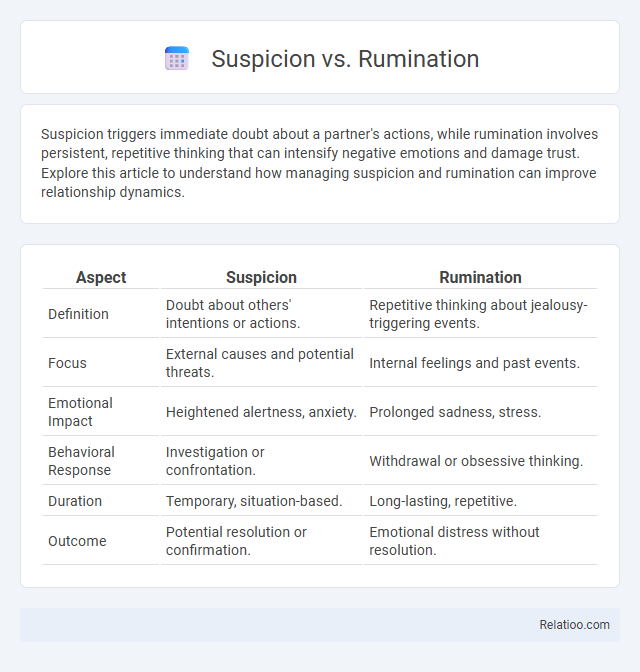Suspicion triggers immediate doubt about a partner's actions, while rumination involves persistent, repetitive thinking that can intensify negative emotions and damage trust. Explore this article to understand how managing suspicion and rumination can improve relationship dynamics.
Table of Comparison
| Aspect | Suspicion | Rumination |
|---|---|---|
| Definition | Doubt about others' intentions or actions. | Repetitive thinking about jealousy-triggering events. |
| Focus | External causes and potential threats. | Internal feelings and past events. |
| Emotional Impact | Heightened alertness, anxiety. | Prolonged sadness, stress. |
| Behavioral Response | Investigation or confrontation. | Withdrawal or obsessive thinking. |
| Duration | Temporary, situation-based. | Long-lasting, repetitive. |
| Outcome | Potential resolution or confirmation. | Emotional distress without resolution. |
Understanding Suspicion and Rumination
Suspicion involves a cautious mindset where You question motives or intentions, often based on incomplete evidence, while rumination is repetitive, obsessive thinking about distressing situations or emotions without resolution. Understanding suspicion helps identify when doubts are grounded versus when they escalate into unproductive rumination, which exacerbates anxiety and impairs decision-making. Distinguishing these cognitive processes enables better emotional regulation and clearer analysis of social interactions.
Key Differences Between Suspicion and Rumination
Suspicion involves a cautious or mistrustful attitude toward someone based on limited evidence, prompting alertness to potential threats or deceit. Rumination refers to repetitive, passive focus on negative thoughts or experiences, often exacerbating stress and emotional distress without leading to constructive outcomes. The key difference lies in suspicion's external focus on others' intentions or behaviors, whereas rumination centers on internal reflections and worries.
Psychological Roots of Suspicion
Suspicion originates from the psychological roots of mistrust and perceived threat, often triggered by ambiguous or incomplete information that causes Your mind to question others' intentions. Unlike rumination, which involves repetitive, negative thinking about past events or potential outcomes, suspicion specifically fuels vigilance and alertness to potential deceit or harm. Rumination can exacerbate suspicion by reinforcing negative beliefs and increasing anxiety, creating a cycle that impacts emotional well-being and decision-making.
Cognitive Mechanisms Behind Rumination
Rumination involves repetitive, passive focus on negative thoughts and emotions, driven by cognitive mechanisms like impaired cognitive control and biased attentional processes. Suspicion triggers targeted, often mistrusting thoughts about others' intentions, engaging threat detection systems without the sustained self-focused loop seen in rumination. Unlike suspicion, rumination maintains intrusive negative self-referential cognition that disrupts problem-solving and emotional regulation.
Impact on Mental Health: Suspicion vs Rumination
Suspicion often triggers heightened vigilance and anxiety, leading your mind to constantly scan for threats, which can increase stress levels and disrupt emotional stability. Rumination involves repeatedly dwelling on distressing thoughts or problems, intensifying feelings of depression and helplessness by trapping your mind in negative cycles. Both suspicion and rumination negatively impact mental health by fostering chronic stress and emotional exhaustion, but rumination is more closely linked to sustained depressive symptoms and impaired cognitive function.
Common Triggers for Suspicion
Common triggers for suspicion include past betrayals, inconsistent behaviors, and ambiguous communication, which prompt individuals to doubt others' intentions. Unlike rumination, which involves repetitive, inward-focused contemplation often about personal anxieties or regrets, suspicion specifically targets external sources and perceived threats. Persistent suspicion can distort trust dynamics, leading to a cycle where uncertainty fuels heightened vigilance and misinterpretation.
Patterns and Cycles of Rumination
Suspicion often triggers short-term, cyclic thoughts focused on distrust, whereas rumination involves repetitive, intrusive reflection on distressing experiences or emotions, creating persistent mental loops. Patterns of rumination exhibit a recursive cycle where negative thoughts reinforce emotional distress, hindering resolution and increasing vulnerability to anxiety and depression. Understanding these cognitive cycles is crucial for developing interventions targeting maladaptive thought patterns to break the rumination loop effectively.
How Suspicion and Rumination Affect Relationships
Suspicion often triggers mistrust, causing emotional distance and communication breakdowns in relationships, while rumination involves repetitive, negative thinking that can amplify stress and hinder conflict resolution. Your ability to recognize and manage these patterns directly impacts the health and longevity of your connections with others. Understanding the differences between suspicion and rumination helps you address underlying issues before they damage relational trust and intimacy.
Practical Strategies to Manage Suspicion
Suspicion involves doubting others' intentions, while rumination refers to repetitive, negative thinking about past events. Practical strategies to manage suspicion include seeking evidence before jumping to conclusions, practicing mindfulness to stay grounded in the present, and engaging in open communication to clarify misunderstandings. Cognitive-behavioral techniques can also help reframe suspicious thoughts and reduce anxiety.
Effective Techniques to Overcome Rumination
Rumination involves repetitive, negative thinking that keeps your mind stuck on distressing thoughts, while suspicion is a feeling of doubt or mistrust that can also fuel these cycles. Effective techniques to overcome rumination include mindfulness meditation, cognitive-behavioral therapy (CBT), and journaling to redirect your focus and challenge unhelpful thought patterns. Incorporating physical activity and setting specific worry times can further reduce the intensity and frequency of rumination, helping you regain mental clarity.

Infographic: Suspicion vs Rumination
 relatioo.com
relatioo.com